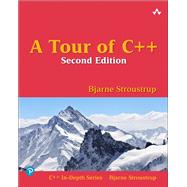In A Tour of C++, Second Edition, Bjarne Stroustrup, the creator of C++, describes what constitutes modern C++. This concise, self-contained guide covers most major language features and the major standard-library components—not, of course, in great depth, but to a level that gives programmers a meaningful overview of the language, some key examples, and practical help in getting started.
Stroustrup presents the C++ features in the context of the programming styles they support, such as object-oriented and generic programming. His tour is remarkably comprehensive. Coverage begins with the basics, then ranges widely through more advanced topics, including many that are new in C++17, such as move semantics, uniform initialization, lambda expressions, improved containers, random numbers, and concurrency. The tour even covers some extensions being made for C++20, such as concepts and modules, and ends with a discussion of the design and evolution of C++.
This guide does not aim to teach you how to program (for that, see Stroustrup’s Programming: Principles and Practice Using C++, Second Edition), nor will it be the only resource you’ll need for C++ mastery (for that, see Stroustrup’s The C++ Programming Language, Fourth Edition, and recommended online sources). If, however, you are a C or C++ programmer wanting greater familiarity with the current C++ language, or a programmer versed in another language wishing to gain an accurate picture of the nature and benefits of modern C++, you can’t find a shorter or simpler introduction than this tour provides.








